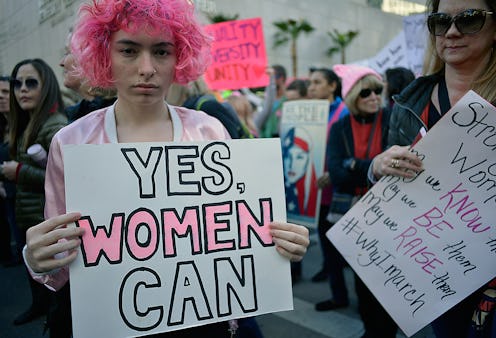Life
How To Talk To Your Boss About The Women's Strike

Yesterday, the organizers of the Women’s March on Washington announced a date for A Day Without A Woman, a general strike in support of gender equality and women’s rights. If you’re planning on joining in, you may be wondering how to talk to your boss about the women’s strike before it begins on March 8. You’re of course not required to tell your boss about your participation in the strike, but the strike will be most effective if the people around you —especially employers — know what it is and why it is so important.
A Day Without A Woman is schedule for March 8, which also happens to be International Women’s Day. Following the massive turnout in January for the Women’s March on Washington and sister marches around the world, the strike represents the next major step in the resistance against policies and attitudes that work against gender equality. Organizers have yet to release many details about the form the strike will take, but it’s safe to assume from the term “general strike” that the event will involve people staying home from work or setting aside domestic duties, and perhaps refraining from spending money — essentially, showing what “A Day Without A Woman” would look like, in order to highlight how integral women are to the labor force, economy, and general functioning of the nation.
The strike has the potential to be a powerful way to build upon the momentum created during the Women’s March, but it is not without controversy. Many commenters on social media have pointed out that the women’s strike assumes a certain degree of privilege: Not all women have the ability to take time off of work or step away from their duties as caregivers, and many of the women who would be least able to take part in a strike — especially poor women and women in marginalized communities — are those who stand to be most negatively affected by the regressive proposals espoused by Donald Trump and conservatives in Congress (including, for example, repealing the Affordable Care Act, defunding Planned Parenthood, and promoting anti-immigration policies). In yesterday’s Facebook announcement, the strike organizers said that they will be sharing “more information on what actions on that day can look like for you” over the next few weeks. Hopefully, this information will include ideas for how women who can’t take time away from work or their duties at home can nevertheless participate in “A Day Without A Woman” in a meaningful way.
However, if you are able to take the day off from work to participate in the strike, the next questions is, What do you say to your boss? First, let’s be clear about this: You do not have to tell your boss that you are joining the strike, especially if doing so will endanger your employment. Everyone’s workplace environment is different, and only you get to decide how much or how little you reveal to your boss about your life outside of work. If you want to take the day off of work “for personal reasons” and leave it at that, that’s your right.
If you do feel comfortable telling your boss about your participation in the strike, then it’s a good idea to do so — after all, you’re participating in the strike to help spread a message about equality, resistance, and the importance of women to the labor force. Who better to hear that message than employers?
A good place to start when talking to your boss about the strike is with the announcement of the strike itself. The organizers wrote,
We ask: do businesses support our communities, or do they drain our communities? Do they strive for gender equity or do they support the policies and leaders that perpetuate oppression? Do they align with a sustainable environment or do they profit off destruction and steal the futures of our children? We saw what happened when millions of us stood together in January, and now we know that our army of love greatly outnumbers the army of fear, greed and hatred.
It might also be helpful to review the “Unity Principles” of the Women’s March, and explain to your boss the key points that matter most to you. In talking to your boss about the strike, explain simply and straightforwardly why you are participating. Why do you think it is important? What goals are you pursuing?
One effective way to speak to your boss about the strike could be to highlight the aspects of your job (if there are any) that you want to see extended to other workers. If, for example, you are lucky enough to have a job with pay equity, paid family leave, a living wage, or women employed at all levels of the hierarchy, talk to your boss about why those things are so important to you. Frame your participation in the strike as evidence of your desire for others to have the same benefits that you have. You might also try explaining to your boss why things like paid family leave are beneficial to companies, not only employees.
In the weeks leading up to the strike, we will no doubt get more details about the shape the strike will take, and the types of activities available to participants in lieu of working on March 8. These activities, from marching to volunteering in your community, might also provide useful entryways into discussing the strike with your boss.